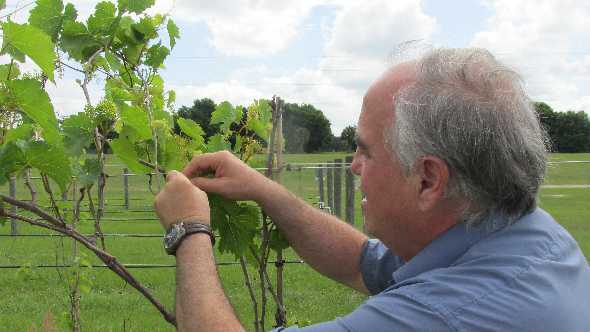Researcher Using ‘Precision Breeding’ To Create Disease-Resistant Winegrapes
University of Florida researcher Dennis Gray is developing disease-resistant grapes, using a method he calls “precision breeding” to create varieties less vulnerable to powdery mildew and black rot.

UF/IFAS developmental biologist Dennis Gray inspects the progress of grapevines in a vineyard.
Photo courtesy of UF/IFAS
Gray, a UF/IFAS developmental biologist, has successfully bred Thompson Seedless, Seyval Blanc, and Syrah that resist mildew and fungus. Those are just three of only 35 grape varieties that accounted for 66% of the world grape acreage in 2014, he said.
According to Gray, precision breeding simply takes one or two desirable traits from one plant and inserts that DNA into another plant to create the new, improved varieties.
Producers currently rely on frequent use of pesticides and fungicides to control diseases of grapes, particularly in areas of high humidity. Gray says that precision breeding creates varieties that don’t need to be sprayed or sprayed less frequently, thus reducing the amount of pesticides and fungicides needed.
Looking forward, Gray is seeking to develop a grape that is resistant to Pierce’s Disease. Federal and state governments, mainly in California, have spent more than $50 million in the last 15 years to fight it with little to no success.
Gray also is seeking to move away from what he calls the scientifically inaccurate term “genetic modification” to the more accurate “precision breeding,” and inform the public that it is less disruptive than conventional breeding and will finally allow the 35 ancient cultivars grown in most of the world to be genetically improved.
“Without exception, all crops used for food and fiber have been intentionally genetically modified by humankind,” Gray said. “It is a fact that every fruit, vegetable and grain, including all produce labeled ‘organic,’ we purchase from the grocery store or farmers’ market are significantly and purposely genetically modified.”
He points to earlier studies, showing that humans began choosing seeds from the best plants as early as the Neolithic period, some 12,000 years ago.
A study on Gray’s precision breeding research was recently published in the journal Acta Horticulturae.









